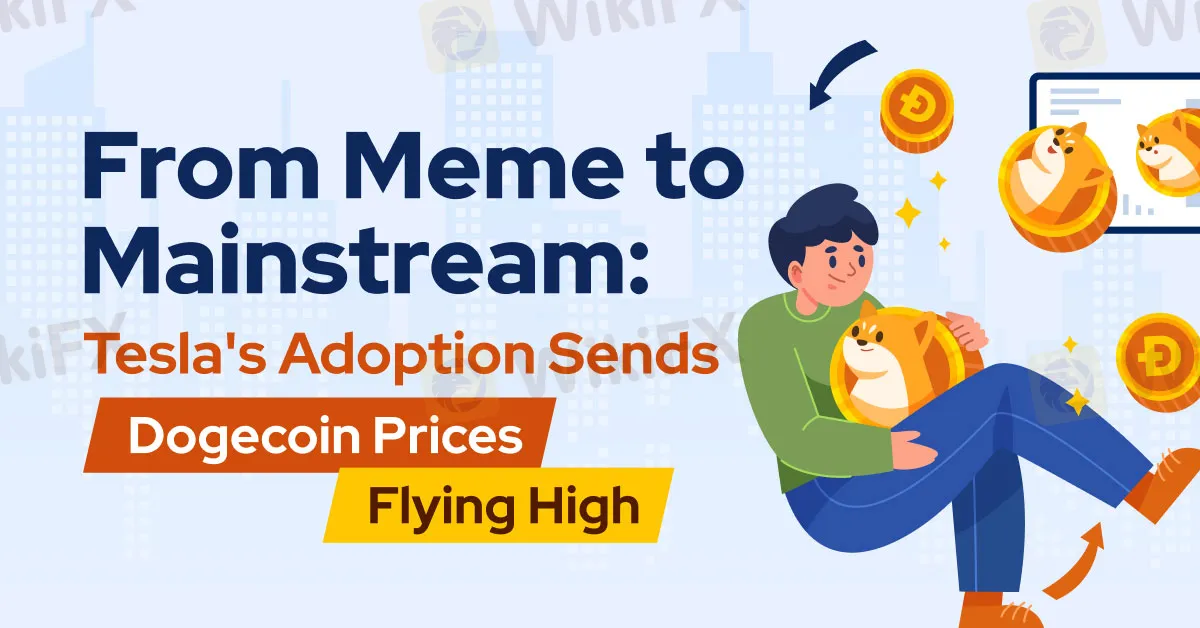简体中文
繁體中文
English
Pусский
日本語
ภาษาไทย
Tiếng Việt
Bahasa Indonesia
Español
हिन्दी
Filippiiniläinen
Français
Deutsch
Português
Türkçe
한국어
العربية
From Meme to Mainstream: Tesla's Adoption Sends Dogecoin Prices Flying High
Abstract:Recently, Tesla has quietly updated its website, unveiling its acceptance of DOGE as payment for select products. While the option to purchase a Tesla vehicle with DOGE remains unavailable, customers can utilize DOGE to acquire various merchandise items.

Elon Musk, CEO of Tesla, stirred the virtual waters on April 2, 2019, when he casually lauded Dogecoin as his “favorite cryptocurrency” via X (formerly known as “Twitter”). This seemingly innocuous endorsement set off a chain reaction, propelling Dogecoin into the limelight and ushering in a new era of memecoin mania. Fast forward five years, Musk's affection for DOGE endures, evidenced by Tesla's recent embrace of DOGE payments for its merchandise offerings.
During a visit to the Berlin gigafactory, Musk entertained inquiries regarding the possibility of enabling DOGE payments for Tesla vehicles. In response, Musk expressed receptiveness to the idea, eliciting enthusiastic cheers from the audience.
Shortly thereafter, on May 4, Tesla discreetly updated its website, unveiling its acceptance of DOGE as payment for select products. While the option to purchase a Tesla vehicle with DOGE remains elusive, customers can utilize DOGE to acquire various merchandise items.

The transaction process is straightforward: users are allotted a brief window to transfer a specified amount of DOGE to the Tesla wallet, inclusive of applicable taxes and fees. Failure to complete the transaction within the allotted timeframe prompts a reset, generating a new DOGE amount aligned with the token's updated price. Notably, all DOGE purchases are deemed final and non-refundable.
Despite Tesla's decision not to issue a formal announcement regarding this development, enthusiasts of both the company and DOGE swiftly detected the alteration. Media outlets promptly caught wind of the news, catalyzing a surge in DOGE's price. Within days, DOGE surged from under $0.13 on May 2 to nearly $0.17 by May 6, marking a remarkable price hike of over 20% and adding more than $7 billion to DOGE's market capitalization.
This initiative represents Tesla's second foray into cryptocurrency payments. In 2021, Tesla made headlines by purchasing $1.5 billion worth of Bitcoin and subsequently permitting customers to utilize Bitcoin for transactions. However, the company later reversed course, citing environmental concerns associated with Bitcoin mining and transactions.
This decision carries significant weight, considering that DOGE, a derivative of Bitcoin, employs similar mining techniques for transaction verification. While DOGE operates on a smaller scale and incurs fewer emissions compared to Bitcoin, environmental impact remains a pertinent consideration for Tesla. Nonetheless, it's reasonable to assume that Musk took such factors into account when greenlighting DOGE payments.
Tesla's integration of DOGE could signify cryptocurrency's potential as a viable medium of exchange and store of value in the future. As a perennial trailblazer in innovation, Tesla's embrace of DOGE may offer a glimpse into the evolving landscape of cryptocurrency adoption and utilization.

Disclaimer:
The views in this article only represent the author's personal views, and do not constitute investment advice on this platform. This platform does not guarantee the accuracy, completeness and timeliness of the information in the article, and will not be liable for any loss caused by the use of or reliance on the information in the article.
Read more

Gigamax Scam: Tracking Key Suspects in RM7 Million Crypto Fraud
Malaysian authorities are actively pursuing seven individuals linked to the Gigamax investment scam, which has defrauded investors of over RM7 million. The suspects include an Indonesian national, identified as Awaludin, who is believed to be the mastermind behind the scheme, and six Malaysians who served as promoters and speakers for the fraudulent operation.

Singaporean Arrested in Thailand for 22.4 Million Baht Crypto Scam
Thai authorities have apprehended a 32-year-old Singaporean man suspected of being part of a transnational syndicate involved in cryptocurrency scams. The group is accused of defrauding victims of more than 22.4 million baht (S$886,000) through a fraudulent trading platform.

Kraken and BitGo to Handle FTX Payouts Starting January 2025
Kraken and BitGo will oversee the first FTX payouts starting January 3, 2025. 98% of creditors receive at least 118% of their claims in cash.

FCA Seeks Input to Shape UK Crypto Market Regulations
UK FCA seeks public feedback on crypto rules to improve market transparency, protect consumers, and support growth. Comments are open until March 2025.
WikiFX Broker
Latest News
Spotware Unveils cTrader Store, Global Marketplace for Algo Creators
Elderly Trader Loses RM2.1M in WhatsApp Forex Scam
Gigamax Scam: Tracking Key Suspects in RM7 Million Crypto Fraud
Singaporean Arrested in Thailand for 22.4 Million Baht Crypto Scam
Trader Turns $27 Into $52M With PEPE Coin, Breaking Records
ASIC Sues HSBC Australia Over $23M Scam Failures
WikiFX Review: Is IQ Option trustworthy?
5 Questions to Ask Yourself Before Taking a Trade
FCA Seeks Input to Shape UK Crypto Market Regulations
Understanding the Impact of Interest Rate Changes on Forex Markets
Currency Calculator


